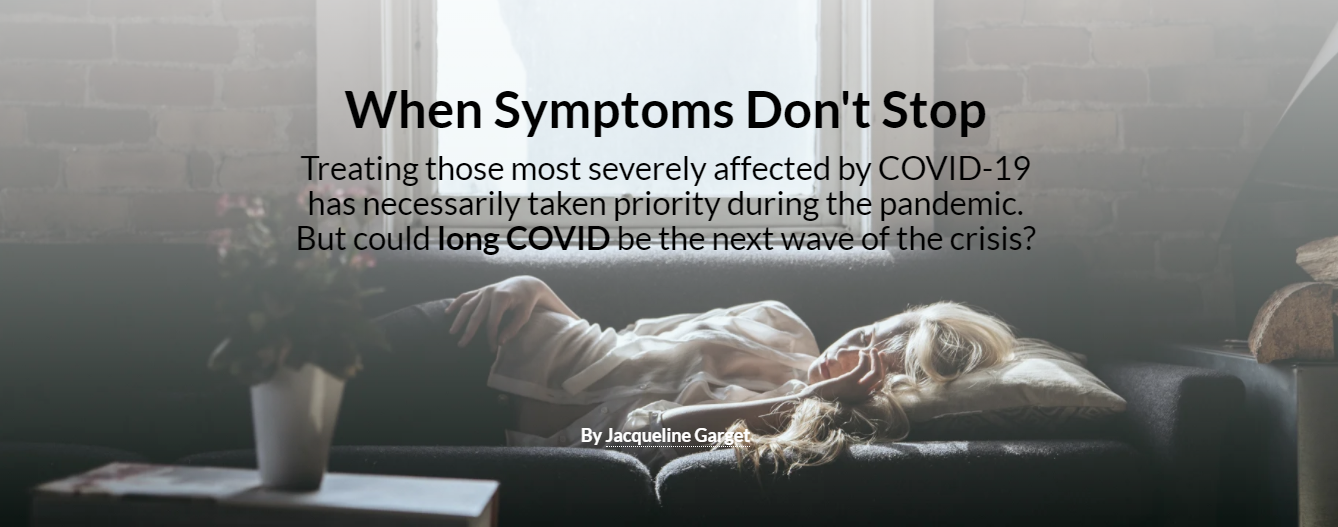
Submitted by Carmyn de Jonge on Mon, 25/01/2021 - 13:55
When Symptoms Don't Stop
Treating those most severely affected by COVID-19 has necessarily taken priority during the pandemic. But could long COVID be the next wave of the crisis?
In late April 2020 Dr Freya Jephcott developed a persistently high fever. When she went to hospital three weeks later, she tested negative for COVID-19. A scan (an extra precaution, given her risky day-job) revealed inflammation in her body but couldn’t point to anything concrete. After two months of fevers she developed painfully swollen ribs and stabbing chest pains. Again, doctors couldn’t find a cause. Things settled but then months later she started experiencing a new range of symptoms: loss of balance, poor coordination, and constant tinnitus - alongside constant fatigue and breathlessness.
I first interviewed Jephcott - a researcher in the University’s Department of Veterinary Medicine - last April for our ‘Tackling COVID-19’ series. She is well aware of the devastation an infectious disease can cause in unprepared populations, having worked with Médecins Sans Frontières on outbreaks in some of the poorest regions of the world.
Jephcott, 33, has managed to emerge unscathed from developing countries fighting outbreaks of infectious diseases like Ebola and TB. But - despite the negative test result - she believes she contracted the coronavirus in Cambridge. When we meet online in December 2020 she looks exhausted, and apologises in advance in case her words don’t come out in the right order.
“The last week has been hellish,” she says. “I don’t know if depressive symptoms are part of long COVID or if it’s just how long it’s gone on. Essentially I get sick, I start to get better, I think I’m over it and then I’ll get hit by another wave of symptoms – sometimes quite distinct from what I had before.”
“I can’t read any more - my language ability just disappeared overnight,” she says. “I’ve started kitchen fires because I keep forgetting things when I’m trying to cook. During the last flare-up I managed to hit my head on a door-frame courtesy of the poor coordination, and ended up getting a handful of stiches."
" This illness is completely debilitating. It’s so disheartening to see people, including doctors, on social media or in the press suggesting it’s psychosomatic or simply the stress of lockdown."
Jephcott isn’t just frustrated by not knowing when all this will end. She’s frustrated because doctors don’t know what’s happening to her, and they don’t know how to treat her. And she’s not alone. Oona Lagercrantz, 19, an undergraduate student at the University, has had suspected long COVID since March last year. As she describes her symptoms, which include a tight chest, fatigue, headaches, muscle twitches and a racing heart, it is again the sense of not-knowing that seems the most difficult aspect for her to deal with.
“When it started in spring I was scared – I didn’t know what was happening to me,” says Lagercrantz. “Now I’m more used to it, and my GP thinks it’s long COVID, although my antibody test was negative so the official diagnosis is ‘post-viral fatigue after a viral-infection’. No-one can tell me what to do to get better. I don’t know if I should try to exercise, or if I should rest. It’s a mental challenge.”
